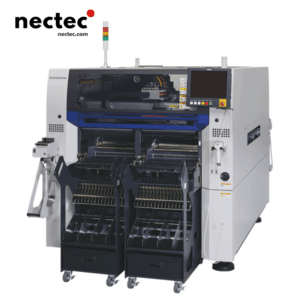In the fast-paced world of manufacturing, efficiency and precision are paramount. As industries continue to evolve, the integration of advanced technologies has become a cornerstone of modern production lines. Among these technologies, pick and place machines stand out as a game-changer, enhancing operational efficiency and accuracy. In this article, we delve into the world of pick and place machines, exploring their benefits, applications, and the future of this remarkable technology.
픽 앤 플레이스 머신이란 무엇인가요?
Pick and place machines are automated devices used for the efficient handling and placement of components in various manufacturing processes. They utilize advanced robotics and vision systems to identify, retrieve, and position components with incredible speed and accuracy. These machines can handle a wide range of products, from electronic components to packaged goods, making them versatile tools in the manufacturing landscape.
픽 앤 플레이스 머신의 주요 기능
One of the main attractions of pick and place machines lies in their specialized features. Some of the key features include:
- 빠른 속도: Modern pick and place machines can operate at remarkable speeds, often placing hundreds of components per minute. This speed not only boosts productivity but also allows for faster turnaround times in production.
- 정확성: With advanced vision systems and precision robotic arms, these machines can achieve remarkable accuracy in component placement, reducing the likelihood of errors and ensuring product integrity.
- 유연성: Many pick and place systems are designed to handle various sizes and types of components and can easily be reprogrammed to accommodate different products. This flexibility makes them an ideal choice for manufacturers looking to adapt to changing market demands.
- 다른 시스템과의 통합: Pick and place machines can be integrated seamlessly with other automated systems, such as conveyor belts and inventory management software, creating a highly efficient manufacturing workflow.
픽 앤 플레이스 기계 사용의 이점
The implementation of pick and place machines comes with numerous advantages for manufacturers, such as:
- 비용 효율성: By reducing labor costs and increasing production speed, manufacturers can significantly lower overall production costs while maintaining high-quality output.
- 인적 오류 감소: Automation minimizes the risk of human error, leading to fewer defects and reworks. This increased reliability is especially crucial in industries where precision is critical, such as electronics and pharmaceuticals.
- 안전 강화: Automating labor-intensive tasks reduces the physical strain on workers and decreases the likelihood of workplace accidents, contributing to a safer working environment.
- 향상된 품질 관리: With precise component placement and automated inspections, manufacturers can enforce stricter quality control measures, ensuring that each product meets the required standards.
픽 앤 플레이스 기계의 애플리케이션
Pick and place machines are utilized across various industries due to their versatility. Some notable applications include:
- 전자 제품 제조: In the electronics sector, pick and place machines are widely used for assembling circuit boards, placing components like resistors, capacitors, and microchips seamlessly and efficiently.
- 식음료 산업: These machines streamline the packing and sorting of food items, from ingredients to final products, ensuring consistency and high-speed operations.
- 제약 부문: In pharmaceuticals, automated pick and place systems are increasingly being used for packaging medication, ensuring compliance with stringent quality standards.
- 자동차 제조: Manufacturers in the automotive industry use these machines for components assembly, enhancing the efficiency of production lines.
AI와 머신러닝의 역할
As technology progresses, artificial intelligence (AI) and machine learning are making their way into pick and place systems. By incorporating AI, these machines can learn from past operations to improve performance continually. This capability allows for better decision-making regarding placement strategies and process optimizations. As a result, manufacturers can achieve even higher levels of efficiency and productivity.
픽 앤 플레이스 기술의 미래 트렌드
As automation and robotics evolve, so will pick and place machines. We can expect to see several trends in the coming years:
- Enhanced Collaboration with Human Operators: With the advent of collaborative robots (cobots), we are likely to see pick and place machines designed to work alongside human workers, improving efficiency and safety in the workplace.
- 스마트 제조: As manufacturers embrace smart manufacturing principles, pick and place machines will become integral to IoT-enabled factories, providing real-time data analytics and performance insights.
- 지속 가능성 이니셔티브: Future machines may focus on reducing energy consumption and waste, aligning with the growing trend towards sustainable manufacturing practices.
- 사용자 지정 옵션: With the rise of personalization in consumer products, pick and place machines will likely become more adaptable to handle smaller batches and unique designs.
도전 과제 및 고려 사항
While pick and place technologies offer numerous benefits, certain challenges must be addressed. Initial investment costs can be significant, which may deter smaller manufacturers from adopting such systems. Additionally, the integration process can be complex, requiring skilled personnel to oversee operations and maintenance. Manufacturers must also stay abreast of technology advancements to ensure their systems remain competitive.
In conclusion, the integration of pick and place machines in manufacturing processes continues to transform the industry, paving the way for enhanced productivity, reduced errors, and improved safety measures. As technology advances, we can expect even greater innovations that simplify and optimize production workflows. Whether in electronics, food and beverage, pharmaceuticals, or automotive manufacturing, pick and place machines are proving to be a vital asset in the drive for manufacturing excellence.






